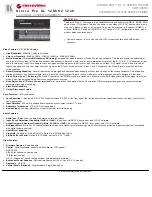
Configuring Data Center Bridging Features
1007
It is recommended that the sum of minimum bandwidth percentages
configured on the CoS queues mapped to any TCG be less than or equal to
that of the weight percentage configured for the TCG, so that packets are not
dropped due to the congestion in the TCG.
In example below, the TCG0 and TCG1 are allocated 30% and 70% of the
bandwidth remaining after servicing TCG2 (strict priority) traffic. TCG2
traffic is handled with strict priority but can only consume up to 100% minus
the sum of the minimum bandwidths of TCG0 and TCG1 (60%).
console(config-if-Te1/0/1)#traffic-class-group weight 30 70 0
7. Set the Minimum Bandwidth for Each TCG (optional)
In this step, the minimum bandwidth is configured for each TCG while in
congestion. The minimum bandwidth setting ensures that a TCG is serviced
during congestion even if a higher priority TCG has an offered load greater
than 100% minus the minimum bandwidth assigned to the other TCGs.
The minimum bandwidth is enforced on the egress TCG regardless of the
scheduling mode and does not directly affect incoming traffic. The minimum
bandwidth for a TCG is configured as a percentage of the total bandwidth,
and the configured minimum bandwidths may sum to less than 100%. The
sum may not exceed 100%. Minimum bandwidth may be configured on a
single interface, a range of interfaces, or all interfaces. It is recommended that
the minimum bandwidth for a TCG be configured to be less than or equal to
the weight of the TCG.
CAUTION:
Sharing of bandwidth among TCGs is disabled if the sum of the
minumum bandwidth settings equals 100%.
console(config-if-Te1/0/1)#traffic-class-group min-bandwidth 10 50 0
8. Set the Maximum Bandwidth for each TCG (optional)
In this step, the maximum bandwidth for each TCG is configured. The
bandwidth allowed for the TCG will never exceed the maximum bandwidth
configured, even if configured for strict priority. This limit is configured as a
percentage of the total bandwidth and is used to shape egress traffic bursts to
no greater than the configured value. The maximum bandwidth may be
configured on a single interface, range of interfaces or all interfaces. When
configured to be 0, unlimited bandwidth is allowed on the TCG.
Summary of Contents for N2000 Series
Page 50: ...50 Contents ...
Page 54: ...54 Introduction ...
Page 134: ...134 Using Dell OpenManage Switch Administrator ...
Page 168: ...168 Setting Basic Network Information ...
Page 206: ...206 Managing a Switch Stack ...
Page 242: ...242 Configuring Authentication Authorization and Accounting ...
Page 318: ...318 Managing General System Settings Figure 12 24 Verify MOTD ...
Page 322: ...322 Managing General System Settings ...
Page 358: ...358 Configuring SNMP ...
Page 388: ...388 Managing Images and Files ...
Page 415: ...Monitoring Switch Traffic 415 Figure 16 2 sFlow Agent Summary ...
Page 451: ...Monitoring Switch Traffic 451 5 On the Capture Options dialog click Manage Interfaces ...
Page 458: ...458 Monitoring Switch Traffic ...
Page 488: ...488 Configuring Port Characteristics Figure 18 3 Copy Port Settings 8 Click Apply ...
Page 502: ...502 Configuring Port Characteristics ...
Page 567: ...Configuring Port and System Security 567 Figure 19 38 Captive Portal Client Status ...
Page 674: ...674 Configuring VLANs Figure 21 17 GVRP Port Parameters Table ...
Page 680: ...680 Configuring VLANs Figure 21 24 Double VLAN Port Parameter Table ...
Page 714: ...714 Configuring VLANs ...
Page 737: ...Configuring the Spanning Tree Protocol 737 Figure 22 9 Spanning Tree Global Settings ...
Page 760: ...760 Configuring the Spanning Tree Protocol ...
Page 786: ...786 Discovering Network Devices ...
Page 793: ...Configuring Port Based Traffic Control 793 Figure 24 3 Storm Control 5 Click Apply ...
Page 878: ...878 Configuring Connectivity Fault Management ...
Page 899: ...Snooping and Inspecting Traffic 899 Figure 27 17 DAI Interface Configuration Summary ...
Page 903: ...Snooping and Inspecting Traffic 903 Figure 27 24 Dynamic ARP Inspection Statistics ...
Page 924: ...924 Configuring Link Aggregation Figure 28 7 LAG Hash Summary ...
Page 982: ...982 Configuring Link Aggregation ...
Page 1062: ...1062 Configuring DHCP Server and Relay Settings ...
Page 1096: ...1096 Configuring L2 and L3 Relay Features Figure 34 3 DHCP Relay Interface Summary ...
Page 1200: ...1200 Configuring OSPF and OSPFv3 ...
Page 1216: ...1216 Configuring RIP ...
Page 1240: ...1240 Configuring VRRP ...
Page 1291: ...Configuring Differentiated Services 1291 Figure 40 5 DiffServ Class Criteria ...
Page 1336: ...1336 Configuring Auto VoIP ...
Page 1367: ...Managing IPv4 and IPv6 Multicast 1367 Figure 43 20 IGMP Cache Information ...
Page 1422: ...1422 Managing IPv4 and IPv6 Multicast ...
Page 1440: ...1440 System Process Definitions ...
Page 1460: ...Index 1460 ...
















































